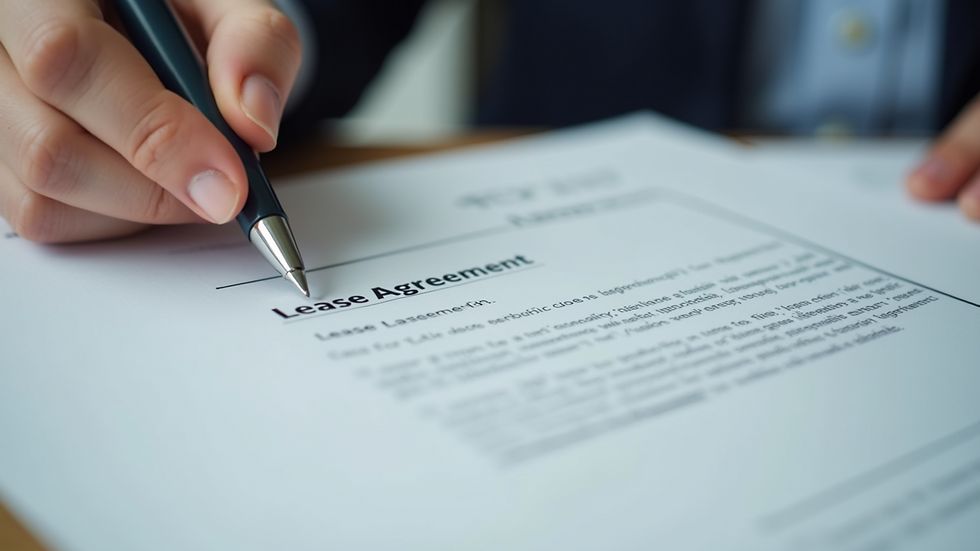What You Need to Know Before Signing a Lease Agreement
- Skyler Jeter
- Aug 8
- 4 min read
Signing a lease agreement is a significant step, whether you're renting an apartment, leasing a car, or securing commercial space. This legal document outlines your rights and responsibilities, so understanding its details is crucial. Many people rush through the process without fully grasping what they are committing to, which can lead to unexpected costs or disputes later on. This guide will walk you through the essential points to consider before putting your signature on the dotted line.
Understanding the Basics of a Lease Agreement
A lease agreement is a contract between a landlord and a tenant that specifies the terms under which the tenant can occupy a property. It typically includes the duration of the lease, rent amount, payment schedule, and rules regarding the use of the property. Before signing, it’s important to read every clause carefully and ask questions about anything unclear.
Some key elements to look for include:
Lease Term: How long does the lease last? Is it a fixed term or month-to-month?
Rent Details: Amount, due date, late fees, and acceptable payment methods.
Security Deposit: How much is required, conditions for its return, and any deductions.
Maintenance Responsibilities: Who handles repairs and upkeep?
Rules and Restrictions: Pet policies, noise limits, and guest rules.
Knowing these details helps you avoid surprises and ensures you can comply with the lease terms.

Important Clauses to Review in Your Lease Agreement
Lease agreements often contain clauses that can significantly impact your experience as a tenant. Here are some critical ones to review:
Early Termination Clause
Understand the penalties or fees if you need to end the lease early. Some leases require you to pay rent until a new tenant is found, while others have a fixed buyout amount.
Renewal Terms
Check if the lease automatically renews or if you need to notify the landlord in advance. Also, find out if rent increases apply upon renewal.
Maintenance and Repairs
Clarify who is responsible for fixing appliances, plumbing, or structural issues. Some leases require tenants to handle minor repairs, while landlords cover major ones.
Subletting and Assignment
If you plan to move out before the lease ends, can you sublet the property? Some landlords prohibit this, while others allow it with permission.
Entry Rights
Landlords usually have the right to enter the property for inspections or repairs but must provide notice. Make sure the notice period is reasonable.
By paying close attention to these clauses, you can protect yourself from unexpected obligations.

Is it better to lease or finance a car?
When it comes to acquiring a vehicle, deciding between leasing and financing is a common dilemma. Both options have pros and cons depending on your financial situation and preferences.
Leasing a Car
Leasing typically involves lower monthly payments compared to financing. You essentially rent the car for a set period, usually 2-3 years, and return it at the end. This option is ideal if you want to drive a new car every few years without worrying about resale value or long-term maintenance.
Financing a Car
Financing means taking out a loan to buy the car outright. You make monthly payments until the loan is paid off, after which you own the vehicle. This option is better if you plan to keep the car for many years and want to build equity.
Factors to Consider
Mileage Limits: Leases often have mileage caps with fees for exceeding them.
Customization: Financing allows you to modify the car; leases usually do not.
Upfront Costs: Leasing may require less money upfront.
Long-Term Cost: Financing can be cheaper over time if you keep the car long-term.
Understanding these differences helps you make an informed decision that fits your lifestyle and budget.

Tips for Negotiating Your Lease Agreement
Negotiating your lease can save you money and improve your rental experience. Here are some practical tips:
Research Market Rates
Know the average rent or lease price in your area to avoid overpaying.
Ask for Concessions
Request waivers for fees like application or pet fees, or ask for a rent discount.
Clarify Maintenance Policies
Negotiate who pays for specific repairs or upgrades.
Request Flexibility
See if the landlord will allow early termination with reduced penalties or permit subletting.
Get Everything in Writing
Any agreed changes should be added to the lease to avoid misunderstandings.
Being proactive and polite during negotiations can lead to better terms and a smoother leasing experience.
What Happens After You Sign the Lease Agreement?
Once you sign the lease, you are legally bound by its terms. Here’s what typically happens next:
Security Deposit Payment: You’ll usually pay this upfront before moving in.
Move-In Inspection: Document the property’s condition to avoid disputes later.
Rent Payments: Set up your payment method and schedule.
Follow Lease Rules: Adhere to all policies to maintain a good relationship with your landlord.
If any issues arise, communicate promptly with your landlord to resolve them amicably.
Final Thoughts on Signing a Lease Agreement
Signing a lease agreement is a commitment that requires careful consideration. By understanding the terms, reviewing important clauses, and negotiating where possible, you can protect your interests and enjoy your new space or vehicle with confidence. Remember, if you want to learn more about leasing options and how to approach them wisely, there are many resources available to guide you.
Taking the time to educate yourself before signing will pay off in peace of mind and financial security.




Comments